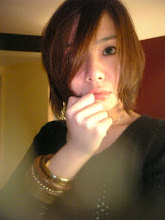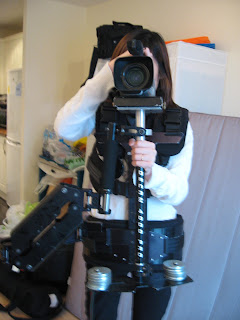This film lasted for a long time becasue most of scenes I shot with my friends in London. We did so many research to find many location and then chose some of them as candidate. There are some fantastic pics and scenes we found on Flickr and wrote down the address.
I played the heroine as well and the hero is my best friend Nic~ the whole progress was full of fun. I wrote the script as other little film we shot.
The shooting style is for regarding Wong Kar-wai who the famouse Chinese Director I love the most. the style is similar with his famous film called "2046"
http://www.imdb.com/video/screenplay/vi2813526297/
The element I like the best is he like focusing on details and the plot always seems jumbled but the aftertast is unlimited.
The story of Wong Kar-wai
Born in Shanghai, he moved to Hong Kong with his parents at the age of five. Coming from the Mainland and speaking only Mandarin and Shanghainese, he had a difficult period of adjustment to Cantonese speaking Hong Kong, spending hours in movie theatres with his mother. After graduating from Hong Kong Polytechnic College in graphic design in 1980, he enrolled in the Production Training Course organized by Hong Kong Television Broadcasts Limited (TVB) and became a full-time television scriptwriter. In the mid-1980s, he became a scriptwriter/director at The Wing Scope Co. and In-gear Film Production Company, the production houses owned by renowned Hong Kong actor /movie producer Alan Tang. Wong's current nostalgic artsy style took shape during his apprenticeship with Alan Tang Kwong-Wing, who invested in the first movie Wong directed, "As Tears Go By" (1988). Wong's career took off when he directed the film "Days of Being Wild" (1990), despite losing Alan Tang millions of invested dollars. Wong subsequently graduated to feature film work. He is credited with about ten scripts between 1982 and 1987, covering an array of genres from romantic comedy to action drama, but claims to have worked to some extent or another on about fifty more without official credit. He considers Final Victory (1986), a dark comedy/crime story for director Patrick Tam, his best script.
Feature films
He made his directing debut in 1988 with As Tears Go By, also produced by Alan Tang. A crime melodrama of the kind then hugely popular, it heavily borrowed from Martin Scorsese's Mean Streets (1974), but already displayed one of Wong's principal trademarks in its atmospheric and sometimes expressionistic color palette. It is his only box office hit to date.
His next film, Days of Being Wild (1991), produced by Alan Tang, a drama about aimless youth set in the early 1960s, established his trademark form: elliptically plotted mood pieces, with lush visuals and music, about the burden of memory on melancholy, misfit characters. Days was a box office failure but now regularly tops Hong Kong critics' polls of the best local films ever made. It has been described as a sort of Cantonese Rebel Without a Cause.
He also established his own independent production company, called Jet Tone Films Ltd. in English. His partner in the company is Jeffrey Lau, a director and producer who tends to work closer to the populist vein of mainstream Hong Kong film.
Wong went on to direct several more feature films in the 1990s produced by Jet Tone, which allowed him to work at his own pace. Among these were Chungking Express (1994), which follows the lives of two love-struck cops in Hong Kong and the mysterious women they meet and fall in love with. Originally intended to be a distraction piece for him to get his mind off of the heavily delayed Ashes of Time, it ended up being one of his most popular films, if not the most popular. Fallen Angels (1995), was originally intended to be the third act of Chungking Express, but when the tone didn't fit with the other two parts, he cut it out and made it a standalone movie instead; it is seen as a semi-sequel to Chungking Express as is a neo-noir film about on a disillusioned killer trying to overcome the affections of his partner, a strange drifter looking for her ex-boyfriend, and a mute trying to get the world's attention in his own ways, all set against a sordid and surreal urban nightscape.
Wong's fourth movie, Ashes of Time (1994), released between Chungking Express and Fallen Angels, applied his approach to a star-studded wuxia (martial arts swordplay) story; the desert shoot in Mainland China dragged on for over a year and resulted in one of contemporary Hong Kong cinema's most notorious commercial disasters.
His first major international recognition was at the 1997 Cannes Film Festival where he won the Best Director prize for Happy Together (1997). A film that "uses gorgeous, saturated images set to an eclectic soundtrack of tango by Argentinian maestro Astor Piazolla, Brazilian singer Caetano Veloso and Frank Zappa instrumentals to chronicle the stormy affair of a gay couple living as expatriates in Buenos Aires."[2] In fact, tracing back to his early career, Wong did celebrate his success without being grateful to his mentor, Alan Tang Kwong-Wing.[citation needed] Wong mentioned Tang's name in his thank you speech at the award ceremony.
Despite his background as a scriptwriter, one of Wong's trademarks as a director is that he works largely through improvisation and experimentation involving the actors and crew rather than adhering to a fixed screenplay. This has been a frequent source of trouble for his actors, his financial backers and many other people connected with his films, including sometimes himself.
The filming of In the Mood for Love (2000) had to be shifted from Beijing to Macau after the China Film Bureau demanded to see the completed script. This was all in all a minor setback in the "very complicated evolution" of the project which goes as far back as 1997. It was Wong's intention to make two films, one of which would be titled Beijing Summer, the plot unclear at the time, but eventually taking form in Macau. Here Wong planned to call it Three Stories About Food, but saw it better to settle for only one story, A Story About Food, that centers on a writer. Together with scenes shot in Bangkok and Angkor Wat, the filming took as long as 15 months. This was an especially arduous time for lead actress Maggie Cheung whose hair and makeup reportedly took a daily five hours, and who appeared in different cheongsams in each scene. She famously compared the lengthy shoot to a cold she couldn't get rid of. Working without deadlines, the film's upcoming premier at Cannes nonetheless put some pressure on Wong to finish editing. Intending to name the film Secrets he was dissuaded by Cannes, and finally named it In the Mood for Love after Bryan Ferry's cover of the song "I'm in the Mood for Love" he was listening to.[3][4]
Wong's 2046 (2004), a film about capturing lost memories, was the third chapter of a shared story that began with Days of Being Wild and continued with In the Mood for Love. Infamous for long drawn out shoots without any real regards to deadlines, a running joke amongst the crew was that he would finish in the year 2046.
In 2006, he became the first Chinese director to preside the jury at the Cannes Film Festival.
Wong Kar-wai's first full English-language film, My Blueberry Nights, opened the 2007 Cannes Film Festival as one of 22 films in competition. The lead, American singer-songwriter Norah Jones, made her acting debut in the film.




